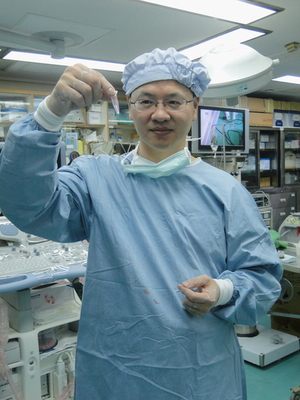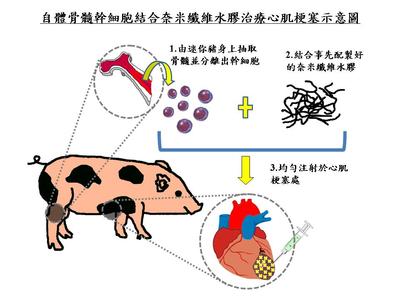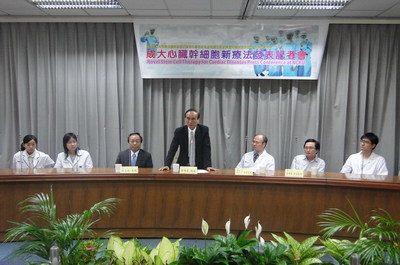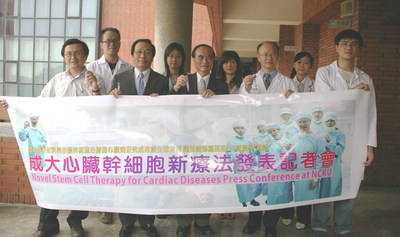NCKU Research Team Developed New Stem Cell Therapy for Heart Repair, First in the World




Tainan, Taiwan, October 12th, 2010
Assistant Prof. Patrick C. H. Hsieh of Institute of Nanotechnology and Microsystems Engineering, College of Medicine, National Cheng Kung University (NCKU), Tainan, Taiwan, has led a research team of myocardial regeneration to conduct an experiment on pigs and has proved that by combining self-assembling peptide nanofiber hydrogel with autologous bone marrow stem cell, myocardial protection after acute myocardial infarction, vascular regeneration and heart functions can be improved.
The research achievement of the novel stem cell therapy for heart repair has been published in Circulation, the top international journal in the cardiovascular field, in September, 2010, and the technology is currently under the applications of domestic and foreign patents.
Each year, 17,000,000 people die from heart disease worldwide. In Taiwan, there are approximately 2,000,000 heart disease patients each year and 400,000 people pass away due to heart failure. The most common cause for the heart disease is coronary occlusion or myocardial infarction, preventing blood from going to the heart and thus leading to myocardial necrosis and apoptosis. The mortality rate reaches as high as 30%.
Even if the patients are fortunate to survive, their myocardial cells lack the ability to regenerate. The myocardial cells cannot take intraventricular pressure and thus they will gradually expand and become thin. Eventually, the patients will have heart failure and face death.
The best clinical treatment is heart transplant. However, due to limited heart donors and risks such as immune rejection and infection, it is not in common use. The most common clinical treatment is drug control, including ACE inhibitors, β-blockers, digitalis glycosides and diuretics. However, they can only slow down disease progression, and they normally have side-effects. Thus, the novel treatment method, the stem cell therapy for heart repair, has become the solution to one of the most urgent medical problems.
NCKU Assistant Prof. Patrick C. H. Hsieh pointed out, “Even though recent research studies have indicated that many types of stem cells can be used to improve heart functions and be clinically effective and secure, there is still room which needs improvement. For instance, when stem cells are cultured outside the body and injected into the heart, most of them are immediately carried away by the blood flow or they face rapid death. Even if few of them survive, they hardly become mature and functional cardiac or vascular cells, thus lack effectiveness. So far, we know that when we inject stem cells into the heart, the survival rate of the cells staying in the heart after 24 hours is less than 1%. However, by combining self-assembling peptide nanofiber hydrogel with stems cells and injecting the mixture into cardiac muscle, the stem cells will not be easily carried away from the heart by the blood. Thus, the retention rate is increased to 100%. In addition, problems such as the source, amount and exclusion of stem cells, as well as how to accurately inject stem cells into damaged parts of cardiac muscle and how to pass trials in large animal experiments to ensure safety are issues yet to be solved.”
To solve the above-mentioned problems, the research team led by Assistant Prof. Patrick C. H. Hsieh has developed novel pharmaceutical compositions and treatment methods, engaged in an experiment on Lanyu miniature pig, which has similar cardiac structure to that of the human beings and used self-assembling peptide nanofiber hydrogel to inject to damaged areas of cardiac infarction, thus reducing sequelae such as ventricular wall thinning and ventricular dilation and improving diastolic dysfunction from 54.2% to 85.5% after cardiac infarction.
The self-assembling peptide nanofiber hydrogel can integrate stems cells from the bone marrow in the miniature pig to effectively prevent pathological ventricular remodeling and diastolic dysfunction, significantly improve the myocardial viability and systolic function from 65.6% to 91.4%, increase the myocardial angiogenesis from 13.7% to 46.5%, reduce the range of myocardial infarction from 18.6% to 11.3%, and even promote potential myocardial regeneration.
One of the characteristics of this research achievement is modeled on the implementation of clinical therapy, from extracting stem cells from the bone marrow and mixing it with nanofiber hydrogel to completing the surgery of cardiac injection, the process only requires 30 minutes.
Assistant Prof. Patrick C. H. Hsieh emphasized, “The time to save acute myocardial infarction patients is extremely precious. Thus a fast and effective treatment method can be applied to myocardial infarction patients in the future or provide a viable alternative to patients who are not suitable for traditional treatment methods.”
Once clinical trials are completed and are developed into treatment method, it is believed that it can benefit many patients and create huge business opportunities. In general, the advantages of this discovery include simple and rapid preparation within 30 minutes, zero side-effects, zero inflammation, zero immune response and currently 0% mortality rate, and research and development potential of integrating drug release of PDGF, FGF, p38, IGF.
The breaking research achievement is funded by the 5 Year 5 Billion Project of the Ministry of Education, Taiwan, National Science Council, National Health Research Institutes, Academia Sinica and NCKU Hospital.
Facilitated by Prof. Jyh-Horung Chen, the former Superintendant of NCKU Hospital and the President of Taiwan Society of Cardiology and Prof. Hua-Lin Wu of Department of Biochemistry and Molecular Biology, the Director of Cardiovascular Research Center, the main members of the research team include Assistant Prof. Patrick C. H. Hsieh of Institute of Nanotechnology and Microsystems Engineering, Assistant Prof. Ming-Long Yeh of Institute of Biomedical Engineering, doctoral students Yi-Dong Lin and Ming-Yao Chang of Institute of Biomedical Engineering, research assistants Da-Ching Tsai, Ting-Yu Zhu, Shih-Ya Yun and Alan C.L. Tang of Stem Cell and Nano Technology Research Lab, Prof. Yu-Jen Yang of NCKU Hospital Department of Surgery, Dr. Yen-Wen Liu of NCKU Hospital Division of Cardiology, Dr. Tsai-Yun Chen of NCKU Hospital Division of Hemato-Oncology, and Dr. Kung-Chao Chang of NCKU Hospital Department of Pathology.
Assistant Prof. Patrick C. H. Hsieh of Institute of Nanotechnology and Microsystems Engineering, College of Medicine, National Cheng Kung University (NCKU), Tainan, Taiwan, has led a research team of myocardial regeneration to conduct an experiment on pigs and has proved that by combining self-assembling peptide nanofiber hydrogel with autologous bone marrow stem cell, myocardial protection after acute myocardial infarction, vascular regeneration and heart functions can be improved.
The research achievement of the novel stem cell therapy for heart repair has been published in Circulation, the top international journal in the cardiovascular field, in September, 2010, and the technology is currently under the applications of domestic and foreign patents.
Each year, 17,000,000 people die from heart disease worldwide. In Taiwan, there are approximately 2,000,000 heart disease patients each year and 400,000 people pass away due to heart failure. The most common cause for the heart disease is coronary occlusion or myocardial infarction, preventing blood from going to the heart and thus leading to myocardial necrosis and apoptosis. The mortality rate reaches as high as 30%.
Even if the patients are fortunate to survive, their myocardial cells lack the ability to regenerate. The myocardial cells cannot take intraventricular pressure and thus they will gradually expand and become thin. Eventually, the patients will have heart failure and face death.
The best clinical treatment is heart transplant. However, due to limited heart donors and risks such as immune rejection and infection, it is not in common use. The most common clinical treatment is drug control, including ACE inhibitors, β-blockers, digitalis glycosides and diuretics. However, they can only slow down disease progression, and they normally have side-effects. Thus, the novel treatment method, the stem cell therapy for heart repair, has become the solution to one of the most urgent medical problems.
NCKU Assistant Prof. Patrick C. H. Hsieh pointed out, “Even though recent research studies have indicated that many types of stem cells can be used to improve heart functions and be clinically effective and secure, there is still room which needs improvement. For instance, when stem cells are cultured outside the body and injected into the heart, most of them are immediately carried away by the blood flow or they face rapid death. Even if few of them survive, they hardly become mature and functional cardiac or vascular cells, thus lack effectiveness. So far, we know that when we inject stem cells into the heart, the survival rate of the cells staying in the heart after 24 hours is less than 1%. However, by combining self-assembling peptide nanofiber hydrogel with stems cells and injecting the mixture into cardiac muscle, the stem cells will not be easily carried away from the heart by the blood. Thus, the retention rate is increased to 100%. In addition, problems such as the source, amount and exclusion of stem cells, as well as how to accurately inject stem cells into damaged parts of cardiac muscle and how to pass trials in large animal experiments to ensure safety are issues yet to be solved.”
To solve the above-mentioned problems, the research team led by Assistant Prof. Patrick C. H. Hsieh has developed novel pharmaceutical compositions and treatment methods, engaged in an experiment on Lanyu miniature pig, which has similar cardiac structure to that of the human beings and used self-assembling peptide nanofiber hydrogel to inject to damaged areas of cardiac infarction, thus reducing sequelae such as ventricular wall thinning and ventricular dilation and improving diastolic dysfunction from 54.2% to 85.5% after cardiac infarction.
The self-assembling peptide nanofiber hydrogel can integrate stems cells from the bone marrow in the miniature pig to effectively prevent pathological ventricular remodeling and diastolic dysfunction, significantly improve the myocardial viability and systolic function from 65.6% to 91.4%, increase the myocardial angiogenesis from 13.7% to 46.5%, reduce the range of myocardial infarction from 18.6% to 11.3%, and even promote potential myocardial regeneration.
One of the characteristics of this research achievement is modeled on the implementation of clinical therapy, from extracting stem cells from the bone marrow and mixing it with nanofiber hydrogel to completing the surgery of cardiac injection, the process only requires 30 minutes.
Assistant Prof. Patrick C. H. Hsieh emphasized, “The time to save acute myocardial infarction patients is extremely precious. Thus a fast and effective treatment method can be applied to myocardial infarction patients in the future or provide a viable alternative to patients who are not suitable for traditional treatment methods.”
Once clinical trials are completed and are developed into treatment method, it is believed that it can benefit many patients and create huge business opportunities. In general, the advantages of this discovery include simple and rapid preparation within 30 minutes, zero side-effects, zero inflammation, zero immune response and currently 0% mortality rate, and research and development potential of integrating drug release of PDGF, FGF, p38, IGF.
The breaking research achievement is funded by the 5 Year 5 Billion Project of the Ministry of Education, Taiwan, National Science Council, National Health Research Institutes, Academia Sinica and NCKU Hospital.
Facilitated by Prof. Jyh-Horung Chen, the former Superintendant of NCKU Hospital and the President of Taiwan Society of Cardiology and Prof. Hua-Lin Wu of Department of Biochemistry and Molecular Biology, the Director of Cardiovascular Research Center, the main members of the research team include Assistant Prof. Patrick C. H. Hsieh of Institute of Nanotechnology and Microsystems Engineering, Assistant Prof. Ming-Long Yeh of Institute of Biomedical Engineering, doctoral students Yi-Dong Lin and Ming-Yao Chang of Institute of Biomedical Engineering, research assistants Da-Ching Tsai, Ting-Yu Zhu, Shih-Ya Yun and Alan C.L. Tang of Stem Cell and Nano Technology Research Lab, Prof. Yu-Jen Yang of NCKU Hospital Department of Surgery, Dr. Yen-Wen Liu of NCKU Hospital Division of Cardiology, Dr. Tsai-Yun Chen of NCKU Hospital Division of Hemato-Oncology, and Dr. Kung-Chao Chang of NCKU Hospital Department of Pathology.
Provider:
新聞中心
Date:
99-10-12



